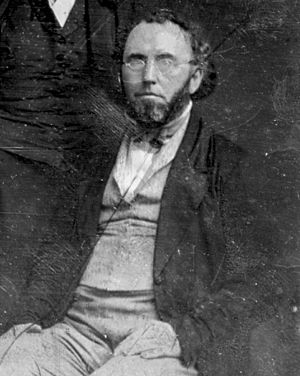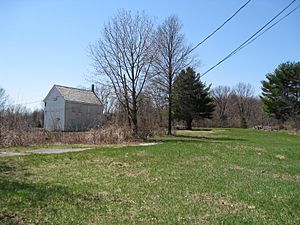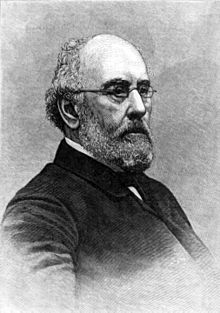George Ripley (transcendentalist) facts for kids
Quick facts for kids
George Ripley
|
|
|---|---|

George Ripley, sometime between 1849 and 1860: a detail from Mathew Brady's daguerreotype of the New York Tribune editorial staff.
|
|
| Born | October 3, 1802 |
| Died | July 4, 1880 (aged 77) New York City, US
|
| Alma mater | Harvard College Harvard Divinity School |
George Ripley (born October 3, 1802 – died July 4, 1880) was an American social reformer and journalist. He was also a Unitarian minister. Ripley was connected to a way of thinking called Transcendentalism. He is best known for starting a short-lived utopian community called Brook Farm in West Roxbury, Massachusetts.
Born in Greenfield, Massachusetts, George Ripley went to Harvard College and finished his studies in 1823. He then graduated from the Harvard Divinity School. The next year, he married Sophia Dana. Soon after, he became a minister in Boston, Massachusetts. There, he started to question some traditional Unitarian beliefs.
Ripley became one of the first members of the Transcendental Club. He even hosted its first meeting at his home. Later, he left the church to try out Transcendental ideas in real life. He did this by creating an experimental community called Brook Farm. This community later changed its model to follow the ideas of Charles Fourier. However, it was never financially stable and eventually closed.
After Brook Farm failed, Ripley got a job with Horace Greeley at the New York Tribune. He also helped publish the New American Cyclopaedia, which made him quite successful. He became well-known across the country for his opinions on literature and taste. He passed away in 1880.
Contents
Biography
What was George Ripley's early life like?
George Ripley was born in Greenfield, Massachusetts, on October 3, 1802. He was the ninth child in his family. His family had lived in Hingham, Massachusetts for many years before moving to Greenfield. His father owned a general store and tavern and was an important person in the town.
George's early life was mostly shaped by women. His closest brother was 13 years older than him. So, his conservative mother and sisters raised him. He went to a private school to get ready for college.
How did Ripley get his education?
Ripley wanted to go to Yale University, which was a very religious school. But his father, who was a Unitarian, wanted him to attend Harvard College. Harvard was known for its more liberal Unitarian ideas. Ripley was a very good and hardworking student. He graduated in 1823.
During his time at Harvard, Ripley became less attached to his hometown. He decided to stay in Cambridge to attend Harvard Divinity School. There, he became very interested in more "liberal" religious views. He called these views "simple, scriptural, and reasonable." He graduated in 1826. A year later, on August 22, 1827, he secretly married Sophia Dana.
Why did Ripley question traditional beliefs?
Ripley became a minister at Boston's Purchase Street Church on November 8, 1826. He became important in the growing Unitarian religion. In March 1836, he wrote an article praising Friedrich Schleiermacher's idea of a "religion of the heart." This idea was based on feelings and a personal connection with God.
Later that year, Ripley criticized Unitarian church leaders. He said they were not tolerant because they demanded people believe in miracles to be church members. Andrews Norton, a famous theologian and Ripley's former teacher, disagreed strongly. He argued that not believing in miracles meant denying Christianity.
This disagreement started a big public debate. Ripley believed that faith did not need physical proof, like miracles. But Norton and many other Unitarians saw this as wrong. This debate helped separate the more extreme ideas of Transcendentalism from its Unitarian roots. The discussion continued until 1840.
What was the Transcendental Club?
Ripley met with Ralph Waldo Emerson, Frederic Henry Hedge, and George Putnam in Cambridge, Massachusetts, on September 8, 1836. They talked about starting a new club. Ten days later, on September 18, 1836, Ripley hosted their first official meeting at his house.
This group became known as the "Transcendental Club." Other members included Amos Bronson Alcott, Orestes Brownson, James Freeman Clarke, and Margaret Fuller. The group met when Hedge visited from Bangor, Maine. People sometimes called them "the brotherhood of the 'Like-Minded'." Starting in 1839, Ripley edited a series of books called Specimens of Foreign Standard Literature. These books showed the wide range of Transcendental ideas.
Why did Ripley leave the church?
During a tough economic time in 1837, many people started to criticize society. Ripley gave a sermon called "The Temptations of the Times." He suggested that the biggest problem was "the excessive desire for wealth." Church leaders asked him to avoid controversial topics.
Ripley felt that a minister should be able to speak freely on all subjects. In May 1840, he offered to resign from the Purchase Street Church but was convinced to stay. Soon, he decided to leave the ministry completely. On October 3, 1840, he gave a long speech explaining why he was unhappy with Unitarianism.
Because of his experience with translations, Ripley became the managing editor of The Dial. This was a Transcendental publication. He handled distribution, subscriptions, printing, and money. He also wrote essays and reviews. In October 1841, he left The Dial to prepare for a new experiment: living in a community. He told Emerson that he wanted to "realize" Transcendental ideas, not just write about them.
What was Brook Farm?
In the late 1830s, Ripley became very interested in "Associationism." This was an early socialist movement based on the ideas of Charles Fourier. In October 1840, he told the Transcendental Club about his plan to start an Associationist community. He had big goals, hoping it would be "a light over this country and this age."
Ripley and his wife started a company in 1841 with 10 other investors. They sold shares for $500 each, promising five percent of the profits. The first members included Nathaniel Hawthorne. They chose the Ellis Farm in West Roxbury, Massachusetts, for their experiment, naming it Brook Farm.
The farm was about 170 acres and about 8 miles from Boston. It was described as a beautiful place, close to the city but also peaceful. However, the land was hard to farm. The community struggled financially as they built greenhouses and craft shops.
Brook Farm was first based on Transcendental ideas. The founders believed that by sharing work, they could support the community and still have time for reading and science. They wanted to show the world an example of "industry without drudgery, and true equality." Many members enjoyed their time there. They wrote about how much they liked the experience. In their free time, they enjoyed music, dancing, games, and parties.
However, Nathaniel Hawthorne, who became the community's treasurer, did not enjoy it. He wrote that "labor is the curse of the world." Many people outside the community also criticized it. Some newspapers suggested they wanted to destroy traditional society.
In 1844, the community was still struggling financially. They wrote a new plan and decided to follow the Fourierist model more closely. Not everyone liked this change, and many members left. The new, more structured daily routine meant less free time, which disappointed some. Ripley himself became a well-known supporter of Fourierism.
By May 1846, Ripley had unofficially left Brook Farm because of its money problems. When it closed a year later, Brook Farm owed $17,445. Ripley was very sad about the failure. His personal life also suffered. His wife became Catholic in 1846 and doubted his political ideas. Their relationship became difficult in the 1850s.
What did Ripley do as a writer?
After Brook Farm, George Ripley started working as a freelance journalist. In 1849, Horace Greeley hired him at the New York Tribune. Ripley started at $12 a week. He was able to pay off Brook Farm's debt by 1862. As a critic, he believed literature should have high moral standards. He usually gave positive reviews.
Greeley used Ripley's cheerful writing style to help the newspaper sell more copies. Ripley wrote a column called "Gotham Gossip." He also wrote many articles about local people and public events. He avoided writing about philosophy or religion. He said he had "long since lost... immediate interest in that line of speculation."
Ripley also edited Harper's Magazine. With Bayard Taylor, he put together a Handbook of Literature and the Fine Arts (1852).
With Charles A. Dana, he edited a 16-volume set called The New American Cyclopaedia (1857–1863). It was later reissued as The American Cyclopaedia (1873–1876). Millions of copies were sold, and it earned over $100,000 right away.
In 1860, he reviewed The Origin of Species by Charles Darwin. He was one of the few critics at the time who understood Darwin's ideas. He was sympathetic, even if he wasn't fully convinced.
What were Ripley's later years like?
In 1861, Sophia Ripley passed away. George Ripley remarried Louisa Sclossberger in 1865. He remained part of the New York literary scene for the rest of his life. He was friendly and avoided the many literary arguments happening in the city. He became a well-known public figure. In 1869, he helped create the National Institute of Literature, Art, and Science. In his later years, he often got sick. He suffered from gout and rheumatism.
Ripley was found dead at his desk on July 4, 1880. He had become financially successful. The New American Cyclopaedia had earned him almost $1.5 million in royalties. A book about his life, called George Ripley, was written in 1882 by Octavius Brooks Frothingham.
Critical assessment
Ripley became very well-known as a critic. Newspapers like the Hartford Courant and the Chicago Daily Tribune said he was one of the most important critics of his time. Henry Theodore Tuckerman praised Ripley. He called him "a scholar and an aesthetic as well as technical critic." He added that Ripley "knows public taste and the laws of literature."
 | May Edward Chinn |
 | Rebecca Cole |
 | Alexa Canady |
 | Dorothy Lavinia Brown |



